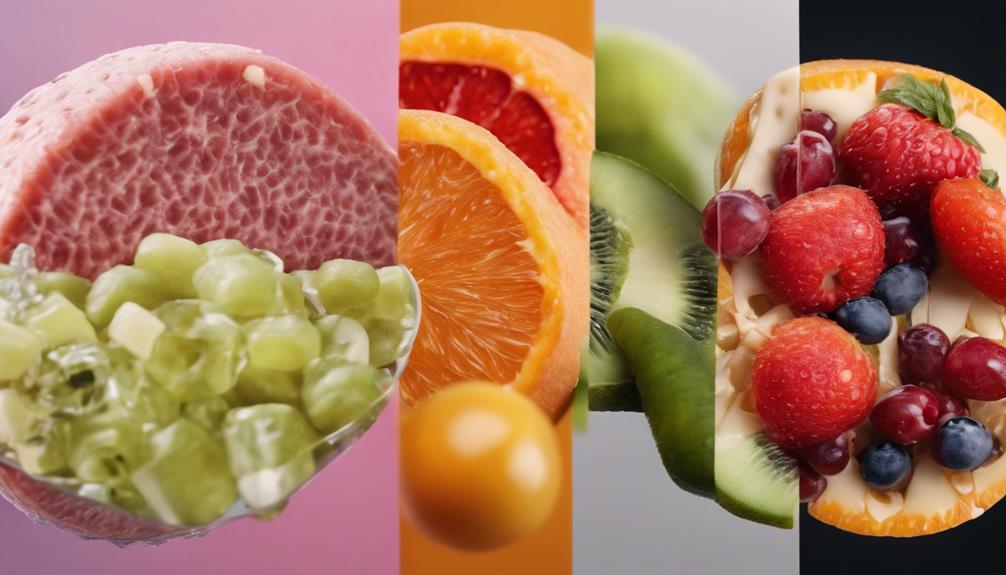The Connection Between Diet and Acne
Have you ever wondered if what you eat could be linked to those pesky breakouts on your skin?
The relationship between diet and acne has been a topic of debate for years, with some claiming certain foods can exacerbate skin conditions. But is there concrete evidence to support this claim, or is it just a myth perpetuated by old wives' tales?
Let's explore the latest research and findings on how your diet might be affecting your skin health.
Key Takeaways
- Hormonal imbalances from high-glycemic foods worsen acne
- Dairy consumption affects skin microbiome, influencing acne
- Proper hydration and nutrient intake support skin health
- Omega-3 fatty acids and antioxidants reduce skin inflammation
Acne Basics and Causes
Understanding the basic causes of acne is crucial in developing effective treatment strategies. Hormonal imbalances play a significant role in the development of acne. During puberty, hormonal fluctuations can lead to an increase in sebum production, which can clog pores and result in acne breakouts. This is why teenagers often experience more severe acne compared to adults. Additionally, hormonal changes during menstrual cycles or due to conditions like polycystic ovary syndrome (PCOS) can also contribute to acne flare-ups.
Skincare routines are another essential factor to consider when addressing acne. Using harsh products or overwashing the skin can disrupt its natural balance, leading to irritation and potentially worsening acne. On the other hand, a gentle cleansing routine, including non-comedogenic products, can help prevent clogged pores and reduce breakouts. Proper hydration and moisturization are also crucial in maintaining healthy skin and preventing excess oil production that can exacerbate acne. By understanding the role of hormonal imbalances and implementing effective skincare routines, you can better manage and treat acne.
Impact of High-Glycemic Foods
The consumption of high-glycemic foods can significantly impact the development and severity of acne breakouts. High-glycemic foods, such as sugary snacks, white bread, and sugary beverages, can lead to spikes in blood sugar levels. These spikes trigger a cascade of events in your body that contribute to the formation of acne. One key mechanism through which high-glycemic foods worsen acne is by promoting hormonal imbalances. High-glycemic foods can stimulate the production of hormones like insulin and insulin-like growth factor 1 (IGF-1), which are known to exacerbate acne by increasing sebum production and skin cell growth.
Moreover, the consumption of high-glycemic foods can also trigger an inflammatory response in the body. This inflammatory response can manifest as redness, swelling, and irritation in the skin, all of which can worsen existing acne lesions and contribute to the development of new breakouts. By opting for low-glycemic alternatives like whole grains, fruits, and vegetables, you can help mitigate the impact of high-glycemic foods on your skin and promote clearer, healthier skin overall.
Role of Dairy Products
Consuming dairy products can impact the occurrence and severity of acne breakouts. The link between dairy intake and acne is attributed to several factors, including hormonal imbalance and alterations in the skin microbiome. Dairy products, especially those high in fat and hormones, can disrupt hormonal balance, leading to increased sebum production and inflammation in the skin. This imbalance can exacerbate acne symptoms and contribute to persistent breakouts.
Moreover, dairy consumption can also alter the composition of the skin microbiome, the community of microorganisms that reside on the skin's surface. Disruption in the skin microbiome can compromise the skin's natural defense mechanisms against acne-causing bacteria, making it more susceptible to inflammation and infection.
To manage acne effectively, individuals concerned about breakouts may consider reducing their intake of dairy products and opting for alternatives that are less likely to trigger hormonal fluctuations and disrupt the skin microbiome. Making informed dietary choices can play a crucial role in supporting skin health and managing acne symptoms.
Omega-3 Fatty Acids Benefits
Dairy products' influence on acne is significant, and now, exploring the benefits of omega-3 fatty acids in managing skin health presents another important aspect in addressing acne concerns. Omega-3 fatty acids play a crucial role in maintaining skin health, particularly in reducing skin inflammation and supporting hormonal balance.
Omega-3 fatty acids, commonly found in fatty fish like salmon, mackerel, and sardines, possess anti-inflammatory properties that can help alleviate skin conditions associated with inflammation, such as acne. By incorporating omega-3 fatty acids into your diet, you may experience a reduction in skin redness, swelling, and irritation, thus promoting clearer skin.
Moreover, omega-3 fatty acids contribute to hormonal balance, which is essential for overall skin health. Hormonal imbalances can often exacerbate acne breakouts, and by consuming foods rich in omega-3 fatty acids, you may help regulate hormone levels and potentially reduce the frequency and severity of acne flare-ups.
Incorporating omega-3 fatty acids into your diet through natural sources or supplements could be a beneficial addition to your skincare routine in managing acne and promoting healthier skin.
Importance of Antioxidants
Antioxidants play a crucial role in protecting your skin from oxidative stress and maintaining its health and vitality. Skin care involves more than just external treatments; what you consume also impacts your skin. Free radicals, unstable molecules in the body, can damage skin cells, leading to premature aging and acne. Antioxidants help neutralize these free radicals, preventing harm to your skin.
| Antioxidant | Food Sources | Benefits |
|---|---|---|
| Vitamin C | Citrus fruits, peppers | Boosts collagen production |
| Vitamin E | Nuts, seeds, spinach | Protects against UV damage |
| Beta-Carotene | Carrots, sweet potatoes | Promotes skin cell turnover |
Including a variety of antioxidant-rich foods in your diet can positively impact your skin's health. As you focus on consuming these nutrients, remember that a holistic approach to skin care involves both internal and external factors. By incorporating antioxidants into your meals, you can nourish your skin from within, promoting a clear and radiant complexion.
Sugar and Acne Relationship
The link between sugar consumption and acne development has been a subject of scientific inquiry and interest. Research suggests that high sugar intake can potentially exacerbate acne due to its impact on skin health. When you consume foods high in sugar, it can lead to an increase in insulin levels in your body. Elevated insulin levels may stimulate sebum production, which is an oily substance that can clog pores and contribute to acne formation.
Moreover, sugar consumption is also associated with inflammation in the body. Inflammation plays a significant role in various skin conditions, including acne. Consuming high amounts of sugar can trigger inflammatory responses that may worsen acne symptoms.
To promote clearer skin and overall skin health, it's advisable to moderate your sugar intake. Opt for whole foods and balanced meals that are low in added sugars to support a healthy complexion. By being mindful of your sugar consumption, you can potentially reduce the risk of acne breakouts and support clearer, healthier skin.
Influence of Fast Food
High consumption of fast food has been linked to an exacerbation of acne symptoms due to its potential impact on skin health. When it comes to acne and junk food, fast food consequences can play a significant role in the development and aggravation of acne.
- High Glycemic Index: Fast food is often high in refined carbohydrates, which can lead to a spike in blood sugar levels. This spike may trigger hormonal changes that can contribute to acne development.
- Unhealthy Fats: Fast food is typically loaded with unhealthy fats, such as trans fats and saturated fats, which have been associated with increased sebum production and inflammation in the skin.
- Lack of Essential Nutrients: Fast food tends to be low in essential nutrients like vitamins A, D, E, and zinc, which are important for healthy skin. A deficiency in these nutrients can worsen acne symptoms.
- Processed Ingredients: Fast food often contains processed ingredients, additives, and preservatives that can disrupt the balance of healthy bacteria in the gut, potentially leading to skin issues like acne.
Gut Health and Skin
Consuming a diet that promotes gut health can have a significant impact on the condition of your skin, potentially influencing factors such as acne development and severity. The gut microbiome, which consists of trillions of bacteria living in your intestines, plays a crucial role in various bodily functions, including immune system regulation and inflammation control. When the balance of these beneficial bacteria is disrupted, it can lead to an overgrowth of harmful bacteria, triggering inflammation throughout the body.
Research suggests that imbalances in the gut microbiome can contribute to skin conditions like acne. By maintaining a diet rich in fiber, fermented foods, and prebiotics, you can support a diverse and healthy gut microbiome. This, in turn, may help regulate inflammation levels in the body, potentially reducing the severity of acne breakouts. Additionally, certain foods like sugar and processed carbohydrates can negatively impact the gut microbiome, leading to increased inflammation and potentially worsening acne symptoms. Prioritizing gut health through a balanced diet may offer benefits not only for your digestive system but also for the overall health of your skin.
Hydration and Acne
Staying adequately hydrated is essential for maintaining healthy skin and may play a role in managing acne. Proper skin hydration supports the skin's natural barrier function, helping to prevent excessive oil production and clogged pores, both of which are associated with acne formation.
Here are four key points to consider regarding skin hydration and acne prevention:
- Water Balance: Maintaining a good balance of water in your body is crucial for overall skin health. Dehydration can lead to dry and flaky skin, exacerbating acne issues.
- Oil Regulation: Well-hydrated skin is less likely to overcompensate by producing excess oil, which can contribute to acne breakouts.
- Toxin Elimination: Water aids in flushing out toxins from the body, reducing the likelihood of inflammation that can trigger acne.
- Healing Process: Hydrated skin tends to heal faster, potentially reducing the duration and severity of acne flare-ups.
Ensuring adequate hydration through water intake is a simple yet effective way to support your skin in the battle against acne.
Effects of Processed Foods
Processed foods can significantly impact the health of your skin and may influence the development or exacerbation of acne. When consumed regularly, these foods often contain high levels of food additives and are classified as inflammatory foods, which can lead to skin issues such as acne. Food additives like artificial colors, flavors, and preservatives are common in processed foods and can trigger inflammatory responses in the body, potentially worsening acne symptoms. Additionally, processed foods tend to have a high glycemic index, causing spikes in blood sugar levels that may contribute to acne development.
To better understand the effects of processed foods on acne, let's delve into a comparison between whole foods and processed foods:
| Nutrient | Whole Foods | Processed Foods |
|---|---|---|
| Fiber | High | Low |
| Antioxidants | Abundant | Minimal |
| Vitamins | Nutrient-rich | Often reduced |
| Minerals | Natural sources | Added in minimal amounts |
Vitamin and Mineral Connections
In the context of diet and acne, the relationship between vitamin and mineral intake and skin health is a crucial aspect to consider. Ensuring you receive adequate amounts of essential nutrients can play a significant role in managing acne and promoting clear skin. Here are four key points to keep in mind:
- Supplement Benefits: Certain supplements like zinc, vitamin A, and probiotics have shown promise in helping reduce acne symptoms. Consult with a healthcare provider before adding supplements to your routine.
- Nutrient Deficiencies: Deficiencies in vitamins A, E, D, and certain minerals like zinc and selenium can potentially worsen acne. A balanced diet rich in fruits, vegetables, whole grains, and lean proteins can help prevent these deficiencies.
- Skin Healing: Vitamins C and E are known for their skin-healing properties. Including foods rich in these vitamins can aid in repairing skin damaged by acne.
- Inflammation Reduction: Omega-3 fatty acids found in fish and nuts can help reduce inflammation in the body, potentially benefiting acne-prone skin.
Best and Worst Diets for Acne
When considering the impact of diet on acne, certain eating patterns can either positively or negatively influence skin health. Maintaining hormonal balance is crucial for managing acne. Diets rich in whole foods like fruits, vegetables, whole grains, and lean proteins can support hormonal balance, potentially reducing acne flare-ups. These foods provide essential nutrients that help regulate hormones and promote skin health. On the other hand, diets high in processed foods, sugary snacks, and saturated fats can disrupt hormonal balance, leading to increased sebum production and inflammation, exacerbating acne.
Moreover, the inflammatory response plays a significant role in acne development. Diets that are high in antioxidants, omega-3 fatty acids, and probiotics can help reduce inflammation and support overall skin health. Foods like berries, fatty fish, nuts, seeds, and fermented foods can be beneficial for individuals struggling with acne. Conversely, diets high in refined sugars, trans fats, and dairy products can trigger inflammation, potentially worsening acne symptoms. Making mindful dietary choices that prioritize hormonal balance and reduce inflammation may positively impact acne management.
Frequently Asked Questions
Can Certain Types of Exercise Worsen Acne?
High exercise intensity can worsen acne due to hormonal changes. Sweating during intense workouts can lead to clogged pores and increased sebum production. To manage acne, consider gentler exercises and proper skincare routines.
How Does Stress Impact Acne Breakouts?
Stress can significantly impact acne breakouts by increasing hormonal influences on skin oil production. It may disrupt skincare routines, exacerbating inflammation and leading to more severe breakouts. Remember, managing stress can help maintain clearer skin.
Is There a Connection Between Food Allergies and Acne?
Food allergies may exacerbate skin conditions like acne. Consult with a dermatologist to identify triggers. Implementing a suitable diet plan can aid in skin care. Follow professional recommendations for optimal skin health and manage acne effectively.
Are There Specific Herbal Supplements That Can Help Improve Acne?
To improve acne, consider herbal remedies that can benefit your skincare routine. Incorporate supplements like zinc, green tea extract, or evening primrose oil. Consult with a dermatologist to find the best options for your skin.
Can Probiotics Play a Role in Improving Acne-Prone Skin?
Probiotics can positively impact acne-prone skin by promoting gut health, which influences the skin microbiome balance. Consuming probiotic-rich foods or supplements may help in maintaining a healthy skin environment, potentially reducing acne symptoms.
Conclusion
In conclusion, the link between diet and acne is significant. Studies have shown that high-glycemic foods can exacerbate acne by increasing inflammation in the body.
Interestingly, research has found that individuals who consume more than three servings of dairy per day are more likely to experience acne breakouts.
By incorporating omega-3 fatty acids, antioxidants, and staying hydrated, individuals can improve their skin health and potentially reduce acne symptoms. Making mindful dietary choices can have a positive impact on skin health overall.











